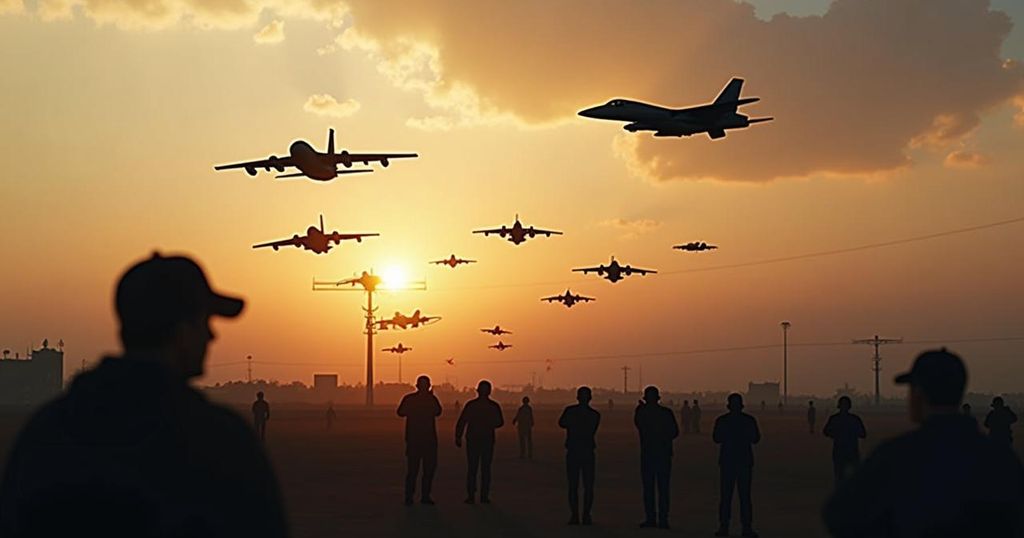Israel Increases Military Operations Against Houthi Targets in Yemen and Hezbollah in Lebanon
Israel has intensified its military operations, conducting airstrikes against Houthi targets in Yemen while continuing attacks on Hezbollah in Lebanon, following the assassination of Hezbollah leader Hassan Nasrallah. The strikes have resulted in significant casualties and displacement among civilians, prompting international calls for a ceasefire amidst fears of a broader regional conflict.
On Sunday, Israel executed significant airstrikes against Houthi targets in Yemen while concurrently intensifying its military campaign against Hezbollah in Lebanon. This dual offensive signifies an extension of Israel’s actions against Iranian-supported groups throughout the Middle East, heightening the potential for a broader regional conflict. The Israeli military operation, particularly in the port city of Hodeidah, employed dozens of aircraft to attack fuel infrastructure, power generation sites, and naval facilities, marking one of the most extensive military actions witnessed in the ongoing crisis in the region over the past year. Military officials indicated that the strikes focused on the Houthis, a group significantly backed by Iran that governs large segments of Yemen. The Houthis have engaged in attacks targeting Israeli interests for months, asserting that their actions are in solidarity with the Palestinians in Gaza. Just prior to the Israeli airstrikes, the Houthis launched a ballistic missile aimed at Israel’s Ben Gurion Airport, coinciding with the arrival of Israeli Prime Minister Benjamin Netanyahu. Israeli statements identified the targeted sites as critical for the Houthis, which have been accused of transferring Iranian weapons to various regions, thereby jeopardizing security and facilitating military operations against Israel. Consequently, the airstrikes led to widespread power outages in Hodeidah, closely followed by renewed hostilities in Lebanon, particularly after the assassination of Hezbollah leader Hassan Nasrallah. His death adversely impacted Hezbollah and Iran, approximating the dismantlement of a key figure within the pro-Iranian militant network known as the “Axis of Resistance” that includes both Hezbollah and the Houthis. The conflict has escalated in Lebanon, with over a thousand casualties reported amidst ongoing confrontations between Israeli forces and Hezbollah. The Israeli military has targeted numerous locations associated with Hezbollah, leading to significant civilian displacement, with recent estimates suggesting that at least 200,000 individuals have been internally displaced within Lebanon as a result of the violence. Netanyahu remarked that Nasrallah’s killing was essential for shifting the regional power dynamics. However, there is an increasing international urgency for a ceasefire, with various diplomatic efforts underway, highlighting the need for a sustainable resolution to restore stability in Lebanon and ensure the safety of its citizens.
The recent military actions by Israel against Houthi positions in Yemen and Hezbollah in Lebanon occur in the context of escalating tensions involving Iran-backed proxies in the Middle East. Following the attack by Hamas on October 7, 2023, which instigated a war between Israel and Hamas in Gaza, the regional landscape has seen intensified military engagements. The Houthis, having launched missile attacks against Israel, have been targeted by Israeli airstrikes as part of Israel’s strategy to neutralize threats posed by groups affiliated with Iran. Concurrently, the assassination of key Hezbollah leader Hassan Nasrallah has added to the volatile nature of the conflicts, signifying a critical juncture in the ongoing struggle against perceived Iranian influence in the region. Amidst the violence, international mediators are advocating for a ceasefire, stressing the necessity of addressing humanitarian needs and achieving long-term stability. However, the complexities arising from the intertwined conflicts in Gaza, Yemen, and Lebanon present significant challenges to diplomatic efforts.
In summary, Israel’s airstrikes against Houthi targets in Yemen and the ongoing bombardment of Hezbollah in Lebanon illustrate the deepening conflict between Israel and Iran-backed militias across the region. The military operations have resulted in severe humanitarian ramifications, including widespread civilian displacement and casualties. International calls for a ceasefire highlight the urgent need for diplomatic resolution, yet the complicated dynamics of the conflict suggest that achieving stability and safety for the affected populations remains an uphill battle.
Original Source: www.theguardian.com




Post Comment